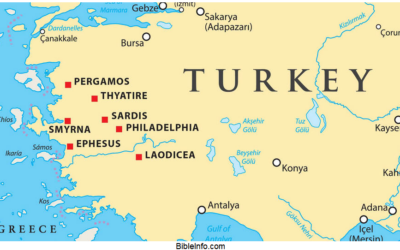When Jesus was on trial before the High Priest and the Jewish leaders, they asked Jesus if He was “the Christ, the Son of God.” The word “Christ” simply means “anointed one” (i.e., Messiah), but why do the Jewish leaders pair “Christ” with “Son of God”? Did they believe that the Messiah would be the divine Son of God? If not, why would they ask the question this way? While this question is often raised to accuse the gospels writers of getting details like this wrong, the truth is that there is a perfectly good reason why the Jewish leaders might say this. The narrative as presented in the gospels actually fits the historical and cultural reality perfectly.
The Context
Our questions derive from the details of Jesus’ trail found in Matthew, Mark, and Luke. Jesus is put on trial by the High Priest and other Jewish leaders before He is handed over to Pontius Pilate and ultimately crucified. During the Jewish trial, we read:
“But Jesus kept silent. And the high priest said to Him, ‘I adjure You by the living God, that You tell us whether You are the Christ, the Son of God,'” (Matthew 26:63).
Mark’s gospel says “Son of the Blessed One,” (Mark 14:61) rather than “Son of God,” but essentially says the same thing as Matthew. When we stop to think about it, this question can seem strange to modern, Christian readers who are accustomed to thinking about the term “Son of God” in distinctively Christian terms. Jesus used the term “Son of God” in a clearly unique and lofty sense that His audience often recognized implied deity (see, for example, John 5:18), but the term by itself could actually be used as a Messianic title without implying deity. In the Davidic covenant of 1 Chronicles 17, God says:
“When your days are fulfilled that you must go to be with your fathers, that I will set up one of your descendants after you, who will be of your sons; and I will establish his kingdom. He shall build for Me a house, and I will establish his throne forever. I will be his father and he shall be My son; and I will not take My lovingkindness away from him, as I took it from him who was before you. ” (1 Chronicles 17:11-13, see also 2 Samuel 7:12-14)
Early Jewish commentators understood this to apply to Solomon and all his line after him culminating in the Messiah.1 The Messiah would thus be the “son of God” covenantally rather than ontologically. A similar reading was given to the Messianic prophecy of Psalm 2 where it says:
“I will surely tell of the decree of the Lord: He said to Me, ‘You are My Son, Today I have begotten You,'” (Psalm 2:7).
We read this same kind of language in Psalm 89. This Psalm is, again, about God’s covenantal promise to David:
“I have made a covenant with My chosen; I have sworn to David My servant, I will establish your seed forever And build up your throne to all generations,” (Psalm 89:3-4).
And later in the Psalm, we read:
“He will cry to Me, ‘You are my Father, My God, and the rock of my salvation.’ I also shall make him My firstborn, The highest of the kings of the earth. My lovingkindness I will keep for him forever, And My covenant shall be confirmed to him. So I will establish his descendants forever And his throne as the days of heaven,” (Psalm 89:26-29).
Thus, a Jew could use the term “son of God” as a title for the Messiah without realizing the Messiah would literally be an eternal, divine person. They would, instead, only mean “the heir of God’s promise to David.” This is, perhaps, all Nathanael originally had in mind when he professed:
“Nathanael answered Him, “Rabbi, You are the Son of God; You are the King of Israel,” (John 1:49).
It seems unlikely that Nathanael had already grasped that Jesus was Yahweh in flesh. And note how he parallels the title “Son of God” with “King of Israel.” Based on the Old Testament Scriptures, this was a perfectly natural title to use for the promised Messiah, son of David, even for a Jew who did not yet realize the full meaning Jesus would give to the phrase. Thus, when the Jewish leaders asked Jesus if He was “the Christ, the Son of God,” they probably only meant “are you the Messiah?” Jesus, however, did not merely say “yes, I am” but rather clarified what He Himself meant by the term “Son of God,” going beyond a mere claim to royalty and making a claim to deity (for more on this, see our article HERE). They seem to have asked Jesus to plainly say He was the Messiah so they could turn Jesus over to the Romans on charges of treason (i.e., claiming to be a king in rivalry to Caesar, charges they still follow through with) Yet, in Jesus’ response, they got far more than they bargained for and they react to His words in shock and horror, convicting Him on charges of blasphemy. They then understood that He was claiming to be God, even though that isn’t what they themselves originally meant by the term.
But What About Luke’s Version?
Some will claim that Jesus’ reporting of the event doesn’t fit with this understanding. Luke describes the conversation in a slightly different order:
“‘If You are the Christ, tell us.’ But He said to them, ‘If I tell you, you will not believe; and if I ask a question, you will not answer. But from now on the Son of Man will be seated at the right hand of the power of God.’ And they all said, ‘Are You the Son of God, then?’ And He said to them, ‘Yes, I am.’ Then they said, ‘What further need do we have of testimony? For we have heard it ourselves from His own mouth,'” (Luke 22:67-71).
Thus, Luke has Jesus already explaining Himself before they ask Him “are You the Son of God?” Doesn’t that imply that, when they asked Him, they did understand the term “son of God” in the same divine sense that Jesus meant? Not necessarily. It is true that Luke reports the conversation in a different order, but it is also true that Luke doesn’t mention the blasphemy charges, focusing instead on the conspiracy to have Jesus executed as a treasonous rival king. The very next thing Luke writes after the verses above is:
“Then the whole body of them got up and brought Him before Pilate. And they began to accuse Him, saying, ‘We found this man misleading our nation and forbidding to pay taxes to Caesar, and saying that He Himself is Christ, a King.’ So Pilate asked Him, saying, ‘Are You the King of the Jews?’ And He answered him and said, ‘It is as you say,'” (Luke 23:1-3).
When they ask Jesus if He is the “son of God,” and Jesus affirms that He is, Luke immediately tells us that they went and turned Jesus over to Pilate for “saying that He Himself is Christ, a King.” All of this, again, points to the idea that when these Jewish leaders used the title “son of God,” they simply meant the Davidic Messiah, the King of Israel. They did not themselves realize that their promised Messiah would be the eternal, divine Son of God. They had not considered the other prophesies that said things like:
“For a child will be born to us, a son will be given to us; And the government will rest on His shoulders; And His name will be called Wonderful Counselor, Mighty God, Eternal Father, Prince of Peace,” (Isaiah 9:6).
Their incomplete view of who the Messiah would be also included and incomplete view of what it meant for him to be “the son of God.”
Conclusion
This passage presents no historical or cultural difficulty for the accuracy of the gospels. Indeed, it fits quite well with what Jewish leaders of the day might say and how they would think about and use these terms. If anything, this is just one more example where the gospels read like real history because that is exactly what they are.
References
| 1↑ | For example, in the Dead Sea Scrolls, 4Q175 interprets 2 Samuel 7:12-14 and Psalm 2 as finding their ultimate fulfillment in the coming of Messiah |
|---|






